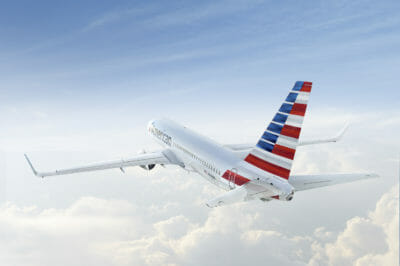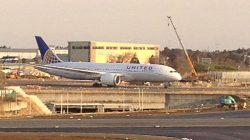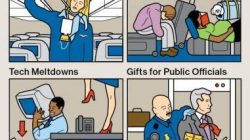In a comment on one of last week’s posts, a reader asked for a more detailed explanation of why I’m leaving United Airlines for American Airlines or Alaska Airlines. I’ll try to satisfy the request. Be aware that this post is a bit of a rant. A fair one, I think, but not everyone wants to read rants.
I want to start by saying that United is a great airline when things work. Their website is one of the best. It’s easy to search for award flights, find information, look at the upgrade standby list, and so on. I think the new mobile app is a step down from what United used to offer, but it still isn’t bad. The remodeled international fleet provides a pleasant travel experience. And I consistently receive excellent customer service from the email support team at 1K Voice.
But lots of airlines look good when things work. The point of loyalty, in my mind, is so that when the going gets tough and I need the airline to support me, I know they have my back. I don’t get that feeling from United Airlines. There are several cogent posts in this FlyerTalk thread about the general situation at United. I particularly like posts #9, 10, and 13, but PV_Premier’s comment sums it up:
It’s hard work to be a UA frequent flyer, you have to be on your game all the time watching out for yourself and you have to know how to use the rules to your advantage to feel like you’re getting the most from your $$.
And isn’t that what loyalty ought to be about, to make the customer feel like his or her dollars are welcome at the company? I admit that I am probably not United’s most profitable customer, yet I disagree that it should be my fault for booking what they choose to publish. I don’t book random trips just to earn miles whenever a mistake fare pops up. I book flights to places I already want to go, I’m usually flexible such that I can pay low fares, and I book enough of these that I earn elite status in the process.
My tickets are frequently for off-peak times and days when there is unsold inventory, so fares are naturally lower and upgrades easier to obtain. Scaring off people like me doesn’t really gain United anything. An empty seat is lost revenue, and rarely am I on a plane that is completely sold out.
Imposing a new requirement for Premier Qualifying Dollars implies that people like me who purchase excess capacity are no longer good enough for United. Yes, there ways around PQD, and even the benefits to a mere Premier Platinum member might be worth spending $25,000 per year on a co-branded credit card for such a waiver. But I struggle to get over the indignation I feel that United even bothers to track revenue outside its Global Services program. It’s incredibly unfriendly to customers, and I have boycotted companies for less.
I think this is enough to explain my position, but I will briefly discuss some key areas where United could improve if it wanted to keep my business.
Treat Frequent Flyers as if They’re Special
…because if you treat me like any other passenger, then I might as well be any other passenger and pick the cheapest/most convenient option.
The last time I asked a gate agent to protect me on a later flight when it looked like I would miss my connection I was told, “We don’t do that anymore.” I have never received any proactive compensation or reaccommodation for delays, malfunctions, and other general screw-ups.
TODs have cut the number of complimentary upgrades. Meal frequency, quantity, and quality have been cut. Flights have been cut such that I often find myself on regional jets up and down the West Coast. And I wish United would just offer its elite members a free drink in economy class rather than make me carry around stupid drink coupons. Such a simple gesture provides an opportunity to recognize a loyal customer. I can’t remember the last time I was personally thanked for flying United today.
Most frustrating: Calls to the 1K phone line are often not routed to the 1K desk. I’ve talked about this with United employees, and they say that United would rather get me to an agent faster, even if that agent is less experienced. I responded that if I had an easy request, I would handle it online. Making me hang up and call again three times to reach a competent representative only makes me angry.
Be More Welcoming of Customer Feedback
One of the most shocking experiences I’ve ever had as a United customer was when a friend introduced me to a United corporate employee at Star MegaDO 4 — a great opportunity for outreach and brand promotion — and that employee looked me in the eye and said, “Oh, you. We don’t care for your blog.” And that was it. I offered to have a conversation and see if anything could be done to work together, but he literally turned his back on me and walked away.
While the hostility may have been directed only at me, to the best of my knowledge, United performs no outreach with travel bloggers. United has only recently (and sparingly) started using my first name in Twitter, which is not that hard to find through my blog even if it isn’t listed on my account profile. I don’t necessarily expect them to reach out, but I find it remarkable because American Airlines and other competitors — who I don’t fly as often — have made this effort.
Putting any special influence from the blog aside, it would be nice if United merely acknowledged me as one of their frequent customers. I know special events take place. I know there is a beta version of the United website. I know there is a forum for discussing improvements to MileagePlus and the airline in general. I’ve never been invited to partake in any of these.
I May Be a Frequent Flyer, but I’m Not a Valued Customer
Some people with the same complaints I have might have switched to a different carrier long ago. The short answer to why I put up with so much hassle is that I valued MileagePlus. I got to travel as I pleased, pick up a few upgrades, and most importantly I got to share the benefits and the miles with my wife when we traveled together.
The devaluation of MileagePlus was the last straw, even though my initial response was more lukewarm. I felt that I could still redeem my miles for domestic flights and certain business class awards at reasonable rates while using other means to earn and redeem awards with partners like Lufthansa and Singapore.
But the more I thought about it, the more I realized that this meant even more travel on United. And then I realized I don’t want to fly United. Not as a paying customer. Not as an award customer. Not ever, really. It’s a pain. Even flying in first class as a Premier 1K member is not something I look forward to anymore.
If my complaints sound angry or petty or unreasonable, well, I did warn you this was a rant. I try to explain on this blog how to take a rational approach to travel to maximize the value you get from every dollar. Elite status can be a part of that strategy. But elite status also means loyalty to a brand, and that loyalty can include many intangible, emotional elements that don’t always make sense. Even if staying loyal to United made sense financially (I no longer think it does), it would not be worth it to me if I hated myself for flying with them.
So for those of you who will continue to fly United, congratulations on having one less person competing for your upgrade. I wish you well. Clearly not everyone is as upset as I am or United would just go out of business. But I have an opportunity here to switch my allegiance, and I hope I have sufficiently answered the question as to why why I would want to leave.
P.S. — I’ve actually considered abandoning airline status altogether. Leaving United doesn’t necessarily mean I have to join American or Alaska or anyone else. My thoughts on this will be shared tomorrow.





